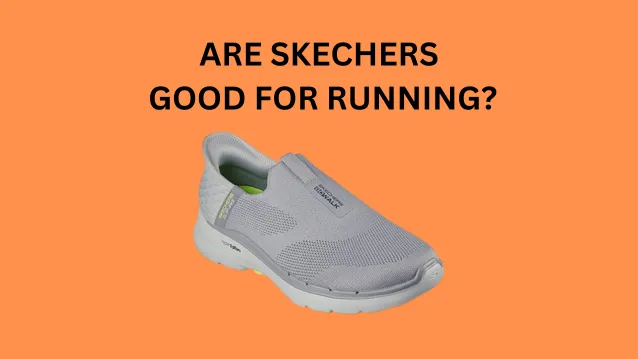With their comfortable designs and affordable prices, Skechers has become one of the most popular casual and athletic shoe brands today. But how well do they perform for running? Can you really log miles in Skechers without hurting your feet or risking injury? Let’s take a closer look.
The Short Answer
Skechers can be good shoes for running, but they’re best for beginners doing occasional short runs rather than serious runners pounding out high weekly mileages.
Some of their well-cushioned performance styles work well for easy paced training runs. But serious runners doing speedwork or marathon distances would be better off looking at brands designed specifically with runners in mind.
Cushioning and Support
Many Skechers sneakers are well-cushioned, prioritizing comfort over speed and weight. Cushioning is important in running shoes to help absorb impact, reducing the pounding on your feet and joints. Models like the Skechers GOrun and Skechers GOrun Max Road have a lightweight responsive foam midsole to cushion your stride.
However, running shoes need to balance cushioning with stability to properly control excess motion that can lead to injury. Where Skechers tends to fall short is support. With their focus more on lifestyle than athletic performance, most Skechers lack stability features like firm medial posts to prevent overpronation. Without these, runners vulnerable to rolling their ankles or arch collapse may get hurt wearing Skechers.
Shoe Weight
In general, Skechers run a bit heavy compared to performance running shoes from Nike, Brooks and other brands engineered for speed. The extra weight usually comes from the more generous cushioning focused on comfort rather than propulsion. This makes them better suited for slower paces rather than trying to set PRs. A shoe like the GOrun Max Road tips the scales at almost 11oz for a men’s size 9, considerably heavier than a dedicated racing flat.
Traction and Durability
The outsoles of Skechers running shoes utilize various traction patterns and rubber compounds fairly effectively without showing excessive or premature wear.
Skechers are affordably priced shoes, so the materials used in their construction may feel a little cheaper compared to premium running shoes. But their durability does tend to match what you would expect for the price you pay.
Fit and Feel
Where Skechers shines through is the comfortable fit their shoes provide right out of the box. Most running focused Skechers have a roomy toe box allowing your feet to splay naturally and ample cushioning underfoot to keep you happy mile after mile.
Just don’t expect the precise foothold serious runners demand to run fast efficiently. And some report the knit upper materials holding more heat than mesh designs better at keeping your feet cool and dry when racking up the miles.
Best Skechers for Running
The Skechers GOrun and GOrun Max Road models represent their most credible shoes specifically designed for running. So which you choose largely depends on the type of running you plan to use them for.
The GOrun 7 Hyper Burst offers a firm responsive ride for faster paced training or races up to a half marathon. At 8.7oz it feels nimble and features a rocker-shaped sole for smooth transitions but lacks the cushioning for all-day wear.
Alternatively, the well-padded GOrun Max Road 5 provides noticeable bounce for easy long distance runs up to marathon distance. An 10.8oz shoe, it feels most at home going at relaxed paces.
Other athletic lifestyle Skechers incorporate performance features that can work for casual jogging. Though lacking the elite pedigree of true running shoes, the gel cushioning and support technologies they do include suit occasional short runs at easy paces.
So in summary, Skechers work reasonably well for recreational jogging but come up a little short meeting the demands of serious runners compared to performance brands like Saucony, Asics and Brooks.
Their strengths lean more towards casual comfort over race-ready speed and support. Prioritizing cushioning and affordability has its advantages for more casual runners on a budget. But competitive runners need to look elsewhere for elite technology engineered to enhance speed and efficiency.
Frequently Asked Questions
Here are answers to some common questions about using Skechers for running.
Are Skechers GOrun good for marathon training?
For easy and moderate paced long runs during marathon training, the Skechers GOrun Max Road performs admirably well. But when you need to incorporate speedwork or marathon pace running, you would be better off in dedicated racing flats from a running brand.
Which Skechers are best for running?
The Skechers GOrun 7 Hyper Burst and Skechers GOrun Max Road 5 represent their most advanced shoes engineered specifically with running in mind. So they make the best options in their lineup for both training and racing use.
Can you run a marathon in Skechers GOrun?
It’s physically possible to complete a marathon in Skechers GOrun shoes. But most runners attempting the 26.2 mile distance would likely be better off choosing a shoe from a brand specializing in marathon racing flats to optimize efficiency and minimize injury risk over the full distance.
Are Skechers GOwalks good for running?
Skechers GOwalks are designed more as comfortable lifestyle shoes for walking rather than the biomechanical demands of running.
They lack the combination of responsiveness, support, and durability featured in the GOrun line engineered specifically for runners. Using them for regular or long-distance running significantly elevates injury risk.
Do Skechers running shoes last?
For moderate mileage casual running, Skecher running shoes typically last around 300-500 miles before the midsole breaks down and lacks adequate cushioning. Higher mileage runners may get less than 250 miles out them compared to 500-1000 miles many performance running shoes deliver.
So there’s a detailed look at how suitable Skechers are as running shoes based on their features and performance trade-offs.
While they can work for recreational jogging, more serious runners should consider looking at athletic brands designing shoes specifically to meet the demands athletes need for optimal speed, efficiency and injury prevention when racking up daily miles.
But for casual runners prioritizing comfort over pace, Skechers do provide ample cushioning that feels great for short, slow runs.

